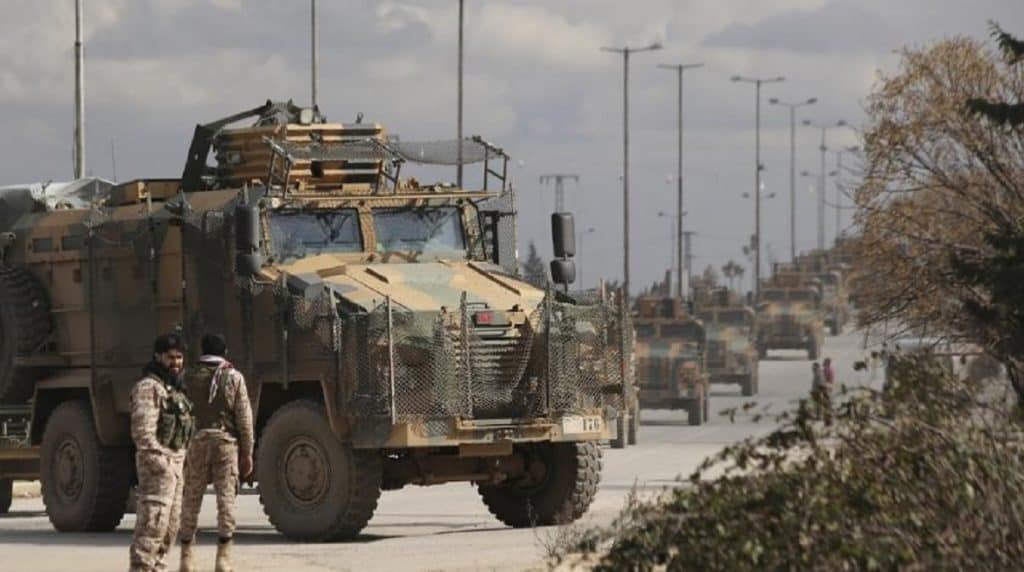By Denis Korkodinov
The President of Turkey was unable to block the offensive of the Syrian Arab Army in Idlib. The deadline for Ankara’s withdrawal of government troops from official Damascus has expired, but the SAA continues to supplant the Turks. As a result of this, Recep Erdogan’s ability to dictate conditions during a meeting in Moscow on March 5, 2020 has been reduced to zero.
The bombing of the Turkish convoy in Idlib, which served as the basis for Russian-Turkish tension, occurred immediately after Washington announced that he had no intention of participating in a military operation on the Turkish-Syrian border and, moreover, to provide Ankara with a military advantage.
This was regarded in Damascus and Moscow as a “good sign”, allowing the Turks to be easily displaced from Syria without fear of interference from the countries of the North Atlantic Alliance. Because of this, the Russian defense department promptly included units of the Turkish army operating in Idlib into the category of undesirable elements against which force can be used. At the same time, the Turkish leader’s statement about the readiness to use the American Patriot systems against the Syrian Arab Army turned out to be unfounded, since the United States will now definitely not help Ankara, on the basis of the inappropriateness of escalating the direct conflict with Russia.
Therefore, Recep Erdogan was in an extremely difficult situation: he deliberately went to aggravate relations with Moscow, believing that the White House administration would certainly give him military support, but Washington suddenly changed its plans, as a result of which the Turkish president would either have to apologize again to Vladimir Putin, or doom his army in Idlib to total annihilation.
After reaching a critical point in the conflict with Moscow, Ankara provoked a migration crisis, opening its borders to refugees traveling to countries of the European Union. Thus, Recep Erdogan expressed his dissatisfaction with France and Germany for disrupting the summit of the international Quartet. The Turkish leader hoped that Angela Merkel and Emmanuel Macron would support him in a dialogue with Russia. But now the situation is such that, as a result of the flow of refugees, France and Germany are likely to take the side of Vladimir Putin and are likely to impose sanctions against Turkey. This will put Recep Erdogan in a knowingly losing position in the initiated negotiation process.
Thus, Ankara actually nullified all existing agreements with the countries of the European Union and Russia. And against this background, she will have to start building relations on the international scene again, where the number of opponents of Turkish politics began to grow exponentially. Under such conditions, the Turkish military campaign in Syria is unlikely to be tangible success, and most likely, the Turks will be forced to leave Idlib.
Obviously, Recep Erdogan on his own initiative blocked the path of the Turkish army in Idlib. In this regard, the offensive of the Syrian Arab Army is likely to continue, despite the militaristic rhetoric of the Turkish president.
In particular, during a meeting in Moscow, Vladimir Putin showed a clear commitment to the resumption of Sochi talks, at which the parties to the international “trio” (Russia, Iran, Turkey) secured their positions on Syria to the extent that they reflect a willingness to take responsibility for creation of a “de-escalation zone” in Idlib. Meanwhile, the Operation Shield of Spring demonstrated that Ankara would not participate in the restoration of the negotiation process if it was not provided with guarantees of security and blocking the actions of government forces of official Damascus. However, in all likelihood, Vladimir Putin is unlikely to provide any guarantees to Turkey, as a result of which Moscow will “close its eyes” if the Turks suffer a crushing defeat.
In addition, it is worth noting that the European countries that were angry with Recep Erdogan for provoking a migration crisis, most likely, will not refrain from helping the Bashar al-Assad regime, and now they are unlikely to be able to portray indifference to the Idlib problem. The same logic is followed by Iran, which considers Russian-Turkish tension as an opportunity to strengthen its position in Syria, which the Turks are very hindering.
Thus, the conflict between Moscow and Ankara may drag on, while Recep Erdogan still does not understand what trap he fell into.
(The views expressed in this article belong only to the author and do not necessarily reflect the views of World Geostrategic Insights).
Image Credit: AP







